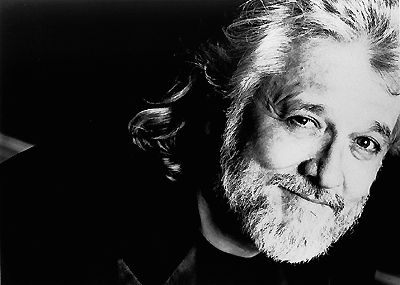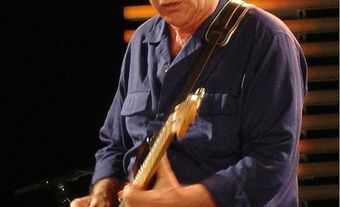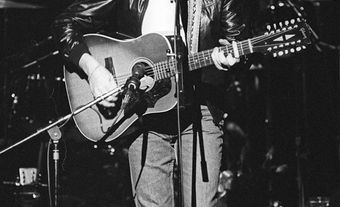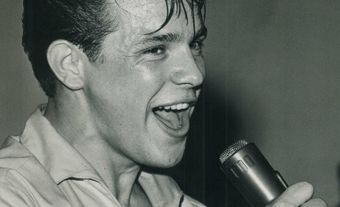Ronald Cornett Hawkins, OC (honorary), singer, songwriter, entrepreneur, actor (born 10 January 1935 in Huntsville, Arkansas; died 29 May 2022). Legendary rockabilly bandleader Ronnie Hawkins was a pioneer of rock music in Canada and a mentor to many of the country's leading rock musicians. Also known as “Rompin' Ronnie Hawkins,” “The King of Rockabilly,” “The Hawk” and “Mr. Dynamo,” he was renowned for his high-energy performances and larger-than-life personality onstage and off. One of rock’s most colourful personalities, Hawkins is regarded by many as "the granddaddy of Canadian rock ‘n’ roll." An honorary Officer of the Order of Canada, he was inducted into the Canadian Music Industry Hall of Fame, Canada’s Walk of Fame, the Arkansas Entertainers Hall of Fame and the Rockabilly Hall of Fame.

Education and Early Career
Hawkins grew up in Fayetteville, Arkansas, where he was influenced by Dixieland jazz, gospel and blues. His father was a barber and his mother a teacher. While studying physical education at the University of Arkansas, he formed his band, The Hawks, and toured with them in Arkansas and nearby states. After dropping out of school, he served in the US army for six months in 1956–57, during which time he fronted a rock ‘n’ roll band, The Black Hawks, made up of African American musicians — a bold move in the US South in the days preceding the civil rights movement.
Hawkins had additional ties to the Fayetteville rock ‘n’ roll scene through his own nightclub, the Rockwood Club, where he engaged such legendary figures as Jerry Lee Lewis, Carl Perkins and Conway Twitty. It was Twitty who convinced Hawkins to take The Hawks to Canada to seek better opportunities.
The Move to Canada
Hawkins and The Hawks’ first performances on the Ontario nightclub circuit were at The Golden Rail Tavern and The Grange in Hamilton in 1958. Hawkins’s straight-ahead rockabilly sound, which brought together elements of rock, blues and country, was highlighted by his rambunctious personality and athletic moves on stage: He would sometimes do a backflip in the middle of performing a song; and his trademark “camel walk” was an early predecessor of Michael Jackson’s famous moonwalk. Hawkins’s high-energy stage act earned him the nickname “Mr. Dynamo.”
From 1959 to 1964, Hawkins and The Hawks were signed to Roulette Records. He enjoyed some success in the US in 1959 with the singles “Mary Lou” and “Forty Days” (a cover of Chuck Berry’s “Thirty Days”), which netted him television appearances in the US on The Dick Clark Show and American Bandstand. Despite offers to return to the US, he chose to remain in Ontario, where he had become popular.
Beginning in 1959–60, a succession of Yonge Street nightclubs (most notably Le Coq D'Or and The Hawk’s Nest) became Hawkins’s home base. For many years, he also operated Campbell's Tavern in London, Ontario. By 1961, he had settled in Toronto and in 1964 he became a permanent resident of Canada (retaining his US citizenship). He eventually moved to Mississauga and later near Peterborough, Ontario. He also managed his own record label, Hawk Records.
Mentor to Canadian Musicians
One of Hawkins’s most notable contributions to Canadian music was his role as mentor to many musicians who went on to have successful careers of their own. He nurtured the talents of numerous artists who played with him early in their careers, including members of The Band and Crowbar, Jack DeKeyzer, Pat Travers, David Clayton-Thomas, Domenic Troiano, David Foster, B.J. Cook, Lawrence Gowan, King Biscuit Boy, Tobi Lark, Bob McBride (Lighthouse) and John Till (Janis Joplin’s Full Tilt Boogie Band).
Hawkins performed or toured virtually non-stop and developed a reputation for a strong work ethic; his backup musicians were expected to practice frequently and strenuously, which contributed to their development as accomplished musicians. Drummer (The Band) described Hawkins as “a great leader, with an uncanny ability to pick the best musicians and build them into first-rate bands.”
Recordings
Hawkins released a number of successful early singles, including his classic version of the Bo Diddley song, “Who Do You Love?” (1963), as well as “Bluebirds over the Mountain” (1965) and “Goin' to the River” (1965). Although his natural focus was rockabilly, he explored other musical genres as well. His 1960 album, The Folk Ballads of Ronnie Hawkins, identified him briefly with the folk music revival. His recording of Gordon Lightfoot's “Home from the Forest” (1967) represented a brief move to country-folk. He also recorded a number of country albums in the early 1980s, including A Legend in his Spare Time (1981) and Songs of Hank Williams (1983). He won the 1982 Juno Award for Country Male Vocalist of the Year and was nominated in the same category in 1985.
John Lennon and US Comeback
In 1969–70, Hawkins enjoyed a well-publicized (though only mildly successful) US comeback, which included a 1969 feature in Rolling Stone magazine and a recording contract with Atlantic Records. The comeback was based on the international success of The Band, and on a brief personal association with former Beatle John Lennon — who, together with Yoko Ono, stayed at Hawkins’s Mississauga home during the couple’s 1969 visit to Canada. In 1969–70, Hawkins travelled with Lennon and Ono via their “peace train” to Ottawa to meet Prime Minister Pierre Trudeau, and then travelled internationally to spread Lennon’s “Love Not War” message.
The Comeback Continued
Hawkins performed at The Band's farewell concert in San Francisco on 25 November 1976 and was featured in the resulting film, The Last Waltz (1978), directed by Martin Scorsese. Following an international renewal of interest in rockabilly, Hawkins performed in the Netherlands and Belgium in 1980 and in England in 1982. He recorded the live album The Hawk & Rock at Dingwalls in London.
Hawkins hosted his own music variety program, CTV's Honky Tonk (1981–82), and welcomed such guests as Johnny Nash, Bo Diddley, David Clayton-Thomas,
Conway Twitty, Eddie Shack and Carroll Baker. Hawkins continued to tour throughout the 1980s, sang
on the charity recording Tears Are Not Enough in 1985, performed at Expo 86 in
Vancouver and hosted New Year's Eve celebrations at Toronto's Nathan Phillips Square for many years.
Hawkins toured and performed throughout the 1990s, e.g., at Cannes, France (1992), the Canadian Embassy in Washington, DC (1995) and his native Arkansas, as well as in Europe (1990 and 1991) and Asia. Bill Clinton invited him to perform at the governor’s mansion in Arkansas several times and at his 1993 presidential inaugural ball in Washington, DC. In January 1995, Hawkins celebrated his 60th birthday with a sold-out concert at Toronto’s Massey Hall, featuring performances by Jerry Lee Lewis, Carl Perkins, The Band, Jeff Healey and Lawrence Gowan. Hawkins toured Canada in support of the resulting live album, Let It Rock! (1995).
Career After 2000
In 2000, Hawkins was featured in an episode of the CBC TV biography series Life and Times. In 2002 he released his 27th album, Still Cruisin’. That same year he was diagnosed with terminal pancreatic cancer and garnered considerable media coverage when he sought treatment from a BC faith healer. In 2004, CTV aired a documentary on his career entitled Ronnie Hawkins: Still Alive and Kickin’, which won a Gemini Award for Best Biography Documentary Program.
Hawkins recovered from cancer and celebrated with a tribute concert at Massey Hall in 2005. With advancing age and health concerns, his public appearances grew fewer but included occasional concerts, such as in Stratford, Ontario, in 2006 and 2008. In late 2013, he undertook a six-city tour in Ontario, including another Massey Hall concert with several guests, including Dan Hill, Amy Sky and Marc Jordan. Hawkins's son, Robin, served as his guitarist since the 1980s, and his daughter, Leah, was often his backup singer.
Acting Career
Hawkins branched out to acting in the late 1970s, playing a version of Bob Dylan in Bob Dylan’s Renaldo and Clara (1978). He also had minor roles in the films Heaven's Gate (1980), Meatballs III: Summer Job (1986) and Duct Tape Forever (2002) with Steven Smith. His television credits include guest roles in the series Seeing Things (1987), Due South (1998) and Doc (2004).
Charitable Involvement
Over the years, Hawkins supported numerous charitable organizations, most notably the Schizophrenia Society of Ontario.
Honours
Hawkins was the subject of Gordon Lightfoot's “Silver Cloud Rolls Royce” and was famed for a certain degree of self-generated legend. His biographer, Peter Goddard, described him as “Elvis, Santa Claus and Robert E. Lee all rolled into one; rock'n' roll godfather to two generations of misfit musicians….”
In 1996, Hawkins received the Walt Grealis Special Achievement Award at the Juno Awards in recognition of his significant role in building a strong music industry in Canada. He was inducted into Canada's Walk of Fame by Kris Kristofferson on 4 October 2002, which was declared “Ronnie Hawkins Day” by the City of Toronto. In 2007, he received a Special Achievement Award from SOCAN for his contributions to the Canadian music industry. In 2013, he was made an honorary Officer of the Order of Canada.
A version of this entry originally appeared in the Encyclopedia of Music in Canada.
Awards
- Country Male Vocalist of the Year, Juno Awards (1982)
- Walt Grealis Special Achievement Award, Juno Awards (1996)
- Inductee, Canada’s Walk of Fame (2002)
- Inductee, Canadian Music Industry Hall of Fame (2004)
- Honorary Doctor of Letters, Laurentian University (2005)
- Special Achievement Award, SOCAN (2007)
- Inductee, Arkansas Entertainers Hall of Fame (2008)
- Inductee, Mississauga Music Walk of Fame (2012)
- Honorary Officer, Order of Canada (2013)
- Inductee, Rockabilly Hall of Fame

 Share on Facebook
Share on Facebook Share on X
Share on X Share by Email
Share by Email Share on Google Classroom
Share on Google Classroom



